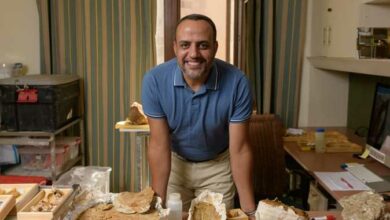Did the universe form gradually over the past 13 billion years as scientists claim, or was it all fashioned in six days by a supernatural being? Did humans evolve naturally from other creatures, or did our ancestors descend on Earth ready-made?
For mainstream scientists, these may seem outdated questions that were answered long ago. James Watson, one of the two co-discoverers of the structure of DNA, says bluntly: “Today, the theory of evolution is an accepted fact for everyone but a fundamentalist minority.”
Possibly unknown to Watson, this “minority” encompasses the vast majority here in Egypt. A recent survey conducted by the British Council globally found that almost 40 percent of Egyptians polled have never heard of Darwin. Moreover, another study published in the academic journal Science in December of last year, looking at the acceptance of evolution in six Muslim countries, showed that less than 10 percent of Egyptians accepted evolutionary theory as either true or probably true, with over 50 percent believing it could not possibly be true.
It was therefore perhaps seen by some as an unusual step for the British Council to organize a three-day conference in Alexandria this November celebrating Darwin’s 200th birthday, as well his revolutionary book, On the Origin of Species, which was published 150 years ago.
The event, held at Bibliotheca Alexandrina, brought together various experts in the fields of evolutionary biology, as well as undergraduate students from Egypt. The hope was to inspire discussion amongst the two groups, but also to offer scientists a chance to discuss the latest research in their own specialist fields.
“The really interesting bits in the conference, however, took place in the corridors,” says Mohammed Yahia, MENA regional coordinator for the Science and Development Network. Yahia was referring to intense discussions that raged outside of the sessions at the conference.
According to Yahia, the majority of Egyptian undergraduates attending the conference rejected the theory of evolution. “Their rejection was based completely on [the theory] conflicting with their faith,” he says. “Few showed any real knowledge of the science behind it … often claiming that the theory said humans were originally apes.” Neither Darwin nor contemporary scientists have ever claimed that, although they did suggest that humans and apes share a more distant ancestor.
“The problem is that evolution isn’t taught properly here,” says Nadia el-Awady, president of the World Federation of Science Journalists. “Even the little information we do come across here is mainly in the form of a backlash to the theory.”
A recent example of such a backlash was highlighted by Al Jazeera news channel last October, when it claimed that the discovery of the oldest fossil skeleton of a human ancestor disproved Darwin’s theory. The story and related claim were further circulated by several other local news sources in the region.
In actuality, the discovery did nothing to disprove the theory, but merely fine-tuned some of the suggested dates about human evolution.
Agenda-driven media aside, the roots of misinformation about evolution stem from further back: high-school and university classrooms. El-Awady, a graduate from Cairo University’s faculty of medicine, says, “We were taught about adaptation, mutation, genetics, but you didn’t ever hear the words ‘evolution’ or ‘Darwin’ in class … let alone study anything about scientific thinking.” Yahia likewise says that in his first year of studying general sciences at Cairo University, nothing was said about the evolution of species.
One professor from the university’s zoology department put it this way: “We just skip over human evolution whenever we teach the theory […] we don’t talk about it.” Even when it is talked about, however, teachers in the Muslim world (and elsewhere) will most likely tell their students that the theory is false and outdated after they have taught it – as shown by the study results presented at the Darwin conference show.
The end result of this lack of valid information about evolution is the rising popularity of creationist “science” – most notably in the US, but also in the Muslim world. For the latter though, anti-evolution sentiments do not embrace the “young Earth” hypothesis: a popular belief among Christian conservatives who assert that the world was created in six days just a few thousand years ago – or more precisely, in 4004 BC, according to some Christian fundamentalists.
While many Muslims also believe that God created the world in six days, the Koran states that each of these days is equivalent to a thousand years in human terms. This appears to have reduced concerns about the scientifically-agreed upon age of the universe among Muslims.
Nevertheless, various Muslim creationist advocates abound, of whom one of the most foremost proponents in Egypt is Zaghloul el-Naggar, a professor of Earth science and geology. El-Naggar’s website displays numerous verses from the Koran that purportedly prophesize scientific discoveries, as well as a map of the world with two lines intersecting in Mecca, supposedly demonstrating “scientific proof that Mecca is at the center of the world.”
El-Naggar, who was not available for comment, has noted in previous interviews that one sixth of the Koran (over a thousand verses) is related to scientific or “cosmic” issues. He is no fan of Darwin’s theory. What he is enthusiastic about, however, is a kind of science-inspired creationism, one that attempts to make science compatible with religious stories, particularly the story of Adam and Eve – possibly that which is most at the heart of all the contention.
“This kind approach [to science and faith] is a problem,” says Yahia. “When science seems to coincide with verses in the Koran, we say this is great, it’s a miracle! Yet where science and religion conflict, we just deny that science has it right in that particular instance.” Yahia was pointing to the “cherry picking” process common among creationists, where only the science that agrees with religion is held to be valid. “This is a clearly self-contradictory,” says Yahia.
Ultimately, Yahia, a Muslim who sees no inherent contradiction between science and faith, believes that the stubbornness of the creationist approach is only pushing Islam into a corner. “If the evidence for human evolution continues to mount and becomes clearly indisputable, those who continued to insist that evolution was wrong will have only helped to discredit Islam” – a situation familiar to the Catholic Church, which previously took positions opposing what are now accepted as basic astronomical facts.
Samy Zalat, former Professor of Biodiversity and Evolutionary Biology at Suez Canal University, agrees that using religion to make scientific claims is the wrong approach to take. “Science is based on skepticism,” he says. “It’s about testing hypotheses, and it’s about the repeatability of those tests. How is faith related to this process? The two look at life differently.”
Zalat believes that any apparent contradiction between science and faith fades away when we perceive religion as a subjective process concerned with moral truths, and science as an objective attempt to understand how mechanisms work. Both Zalat and Yahia agree: “The Koran is not a science book.”
Yet the debate goes on. What is clear is that both fronts – science-inspired creationists, and mainstream Muslim scientists – agree on one thing: that science and faith need not be incompatible. For creationists, however, some of the science may require a bit of tweaking to “fit in.”




